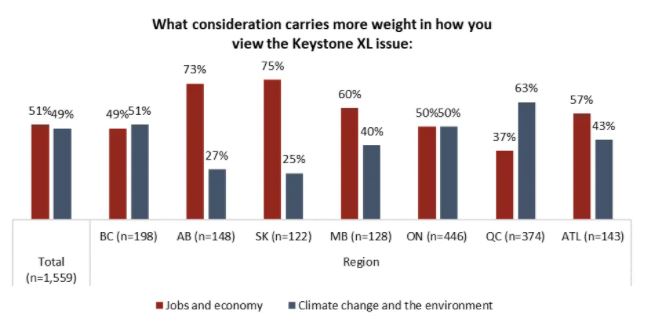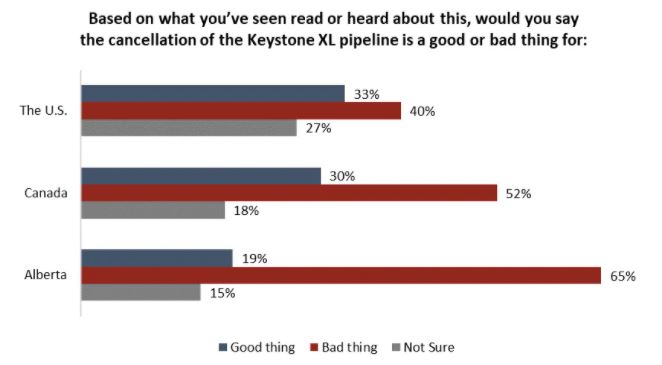As Alberta continues to push for the federal government to do more to save the Keystone XL pipeline project, a new poll shows the majority of Canada thinks it’s time to “move on,” and for the country to focus on other things.

Keystone XL was cancelled last week as one of President Joe Biden‘s first moves once sworn into office. The fallout from the decision is already being felt across Canada with thousands of jobs being lost, but no more so than in Alberta, where Premier Jason Kenney has been pressuring the federal government to take strong action against the U.S. in response, encouraging sanctions in hopes the decision will be reversed.
A recent poll by the Angus Reid institute shows that while the majority of Canadians polled — 65 per cent — understand the Keystone decision is a hard blow for Alberta, most don’t want the federal government to prioritize fighting against the cancellation above other issues.
Nearly 60 per cent of Canadians polled said it’s time for Canada to “move on” from Keystone XL, however when that’s broken down by region, those living in the Prairies still believe Ottawa should push for the pipeline project to be revived.

Seventy-two per cent of Albertans polled think Canada should take action to have the presidential order reversed, which is a stark comparison to the 74 per cent of Quebec respondents who believe the exact opposite.

Institute president Shachi Kurl said that disparity comes primarily from a divide between Canadians for whom jobs and the economy are top of mind, and Canadians who are more focused on the environment.
“Canadians are split almost evenly on environment versus the economy,” Kurl said.

In Alberta and Saskatchewan, three-quarters of those polled look at Keystone XL through the jobs and economy lens, where in the rest of the provinces, respondents were more evenly split, with 63 per cent of those in Quebec saying they viewed the environmental impacts as more important.

However, that divide isn’t the only factor dividing opinion on this political fight, Kurl said.

Get daily National news
“There’s a realization amongst many Canadians that, ‘Hey, this thing was not able to go forward under the Obama administration going back to 2008… this was not done even with the go ahead and the green light under the Trump administration,'” she said.
“I think there is a realization that this was not necessarily a decision that was in the hands of Canadians to begin with.
“They didn’t hold the winning hand. They didn’t hold, no pun intended, the trump card on this one.
“So this wasn’t something that Alberta could get done by lobbying its fellow provinces and the federal government. This was beyond that.”
Kurl said in comparison, Canadians are more invested in the Trans Mountain pipeline project because they literally invested in the pipeline, but also because outside of Alberta, Keystone XL wasn’t a project many Canadians felt personally close to.

University of Calgary associate professor of economics Trevor Tombe said because oil and gas production and exports is highly concentrated to Alberta and Saskatchewan, and on a smaller scale Newfoundland and Labrador, “it’s just really not a top of mind critical issue for governments elsewhere or for economic activity elsewhere.”
So, what does ‘moving on’ look like for Alberta?
According to Tombe, the cancellation of the Keystone pipeline “is not going to make or break the Alberta economy.”
“It’s important not to overstate the importance of just the one project, even though there are certainly thousands of jobs that will be connected to it,” he said.
Tombe said that since the recession started in 2014, jobs in the oil and gas sector are down by 50,000, and the industry wasn’t going to be “roaring back to its pre-recession levels just because of Keystone.”
“The industry faces challenges and most of that, the overwhelming majority of that is driven by low oil prices, not the lack of of pipeline access,” he said.
Tombe said according to Canada Energy Regulator numbers released in November, the Canadian and U.S. commitments to reach net-zero emissions by 2050 would still have allowed for oil production to grow in Alberta, “but it doesn’t grow enough to actually need Keystone.”
“If we and the world does take strong action on climate, Trans Mountain and Line 3 would still be worthwhile projects for us, but that’s it. Oil production may peak at a level where Keystone is not actually needed,” he said.
“So moving on means accepting that it looks like our approach to climate change is… increasing both here and around the world.”

Tombe said then the province needs to turn its focus to supporting the tens of thousands of workers who have been displaced, and helping them get employment in other fields.
And finally, Tombe said Alberta needs to look at diversifying sources of government income, as the lion’s share of that currently comes in the form of revenues from the oil and gas sector.
“Our diversification challenge is to diversify government revenue sources, not necessarily to structurally change the economy itself,” he said.
“I think we should focus more on fixing our budget challenge, which is something we can fully control before we try and tinker with the underlying structure of the economy itself.”
With that should come the difficult, and politically unpopular, conversations around taxes, Tombe said, as the province is on track to bring its spending in line with B.C., Ontario and Quebec by 2022.
“First, we need to talk about sales taxes. It’s a broad, stable source of revenue that every other province has, but we do not. So we need to have at least that conversation,” he said.
He suggested if the government were to implement a sales tax of around five per cent and take revenue from that, it would have a significant impact on reducing the province’s deficit.
“Second is carbon taxes. This is a tax that exists, it’s just levied by the federal government and none of the revenue goes to the Alberta government,” he said.
“If we were to take that back, and introduce, say, a low-income household rebate program rather than the universal one that that we have with the feds, then we could potentially be looking at about $5 billion or so net to the Alberta government by the time it ramps up to $170.”

The poll was commissioned by Angus Reid Institute and done online from Jan. 20 to Jan. 24 and got responses from a randomized sample of 1,559 Canadians who are members of Angus Reid Forum. The margin of error for the poll is +/- 2.5 percentage points, or 19 times out of 20.



Comments
Want to discuss? Please read our Commenting Policy first.